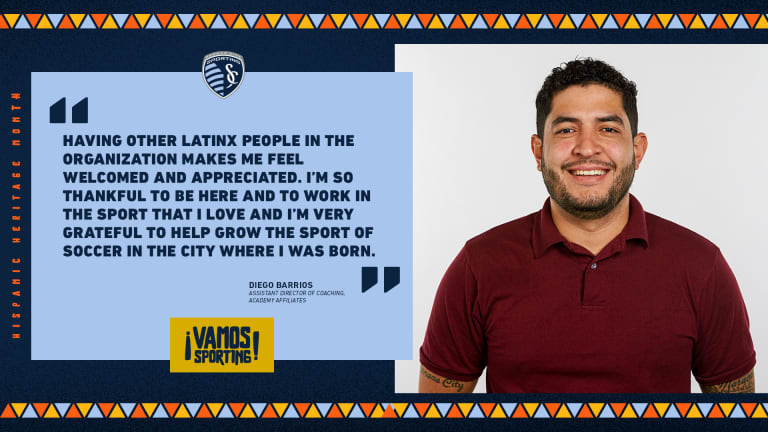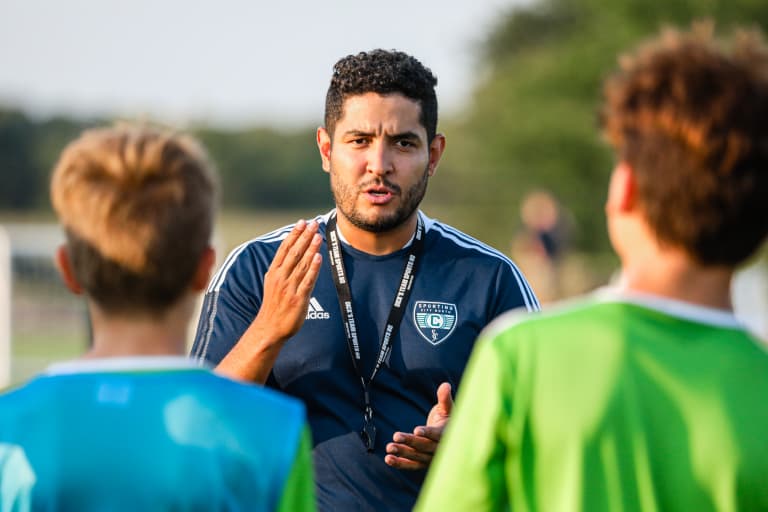Throughout Hispanic Heritage Month, Sporting Kansas City will celebrate their players and associates of Hispanic descent, highlighting their unique heritage and culture.
Diego Barrios is the Assistant Director of Coaching for Academy Affiliates for Sporting Kansas City’s Youth Soccer Department. Born in Kansas City and raised in Venezuela from the age of two, Barrios’ Venezuelan heritage is a crucial part of his life and a large reason why he works in the sport of soccer.
He is so thankful to be at Sporting and to honor his culture through his work. He loves to share his heritage and knowledge of Venezuelan history.

What does Hispanic Heritage Month mean to you…
When I first moved to the United States about six years ago, I wasn’t familiar with Hispanic Heritage Month. I didn’t even know it existed. It took me a few years to get used to the idea of Hispanic Heritage Month and all the celebrations that come with it. It’s good to know that even though I moved from Maracaibo and my home country, there are still ways for me to celebrate my heritage in a different country.
The idea of having a month to celebrate our heritage helps Hispanic people feel welcome here in the United States. It makes me feel grateful for being here. I am thankful for being able to celebrate my heritage with other Hispanic and Latinx people in the U.S.
How did you celebrate your Hispanic heritage growing up in Venezuela…
In Venezuela, the most important times are Christmas, New Year’s and Holy Week, which is the equivalent of a spring break here. Holy Week is the time when families get together and travel to the beach, the mountains or anywhere really. My family and I often traveled to the coast of Venezuela where my dad’s family had a beach house.
Christmas in Venezuela is very similar to America. It’s a big festival and a time for families to get together, give gifts and eat a big dinner. New Year’s, however, is the most important event in Venezuela. We see it as a reset for the next year. I can count on one hand the New Year’s celebrations I spent without my family because it's so important for us to be together. I can miss Christmas, but I cannot miss New Year’s.
When I moved back to Kansas City, it was difficult at times because when we were together, we were so used to it. In the past year, some of my cousins, aunts and uncles moved from around the world to Kansas City. We really appreciate these moments of togetherness after being away from each other for so long. Every week someone will invite people over to their place to make arepas (the national dish of Venezuela), listen to music, dance and have fun; that’s how we celebrate our heritage. We are united in a different country and celebrate together.
What did you learn about your heritage growing up…
When you grow up over there, you take a lot of Venezuelan history classes. We cover all of our past, how we came up as a country and the evolution of politics throughout the years. Those teachings are the reason why I felt so passionate and graduated from the University of Zulia with a Bachelor of Political Science.
Not only in my high school years but in my college years, I spent all my time studying our history. I’m so grateful now. It gave me the tools I have now to teach others about Venezuela, the culture and the history.
Our country is so full of diversity. We took in a lot of European immigrants when World War II ended, but that has changed in the last 15 years. Now there are so many Venezuelans across the world that have emigrated because of the political and economic issues. When I moved here and saw all this diversity, it still amazed me even though Venezuela is a very diverse country.

How do you feel connected to your heritage…
In Venezuela the most important sport is baseball. For some reason, I was always a big fan of soccer because my dad was a big soccer guy. It was destiny to fall in love with the sport when I was eight years old because I am named after Diego Maradona.
Even though I was always pushed into playing baseball, I chose to stay with soccer. One of the ways I celebrate my heritage and stay connected to the people I don’t see every day like my friends and family is to watch the Venezuelan national soccer team. Whether it’s a friendly, World Cup Qualifier or whatever, I will try to get together with some people and watch it. Growing up I had friends from European, Middle Eastern and other South American countries and tying that back to soccer when we stepped on the field, we were all one. I am so connected to soccer I have three tattoos paying homage to the sport I love.
Along with soccer, I honor my heritage with tattoos. One of my tattoos is a Guacamayo (macaw parrot), a very common bird in my country. Also, half of my arm has a tattoo that includes famous landmarks from Maracaibo. One other tattoo I have is the Salto Angel (Angel Falls), the tallest waterfall in the world, which is in Venezuela. That’s how I pay tribute to my country and hometown.
I love being in America and teaching people about where I come from and who I am. If I would not have left Kansas City at age two, I wouldn’t have been able to answer these questions. Now at the age of 30, I can. I lived so many experiences that I wouldn’t be able to have had here. I have had the best of Venezuela and the best of America in my life.



